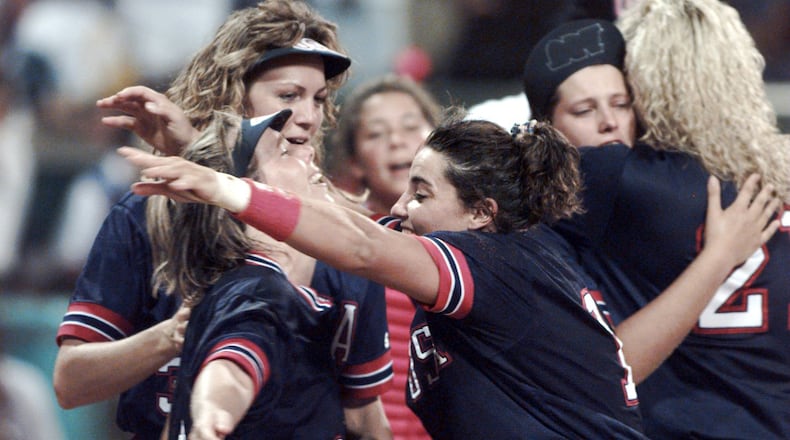On the 25th anniversary of the 1996 Atlanta Olympic Games, The Atlanta Journal-Constitution presents a series of retrospectives produced by the University of Georgia’s Carmical Sports Media Institute. The Eyewitness to History interviews offer the view of someone who was at a top moment on the Summer Games.
The 1996 Atlanta Summer Games created a home-field advantage for the U.S. softball team in the sport’s first Olympic appearance.
In the gold medal game, played in Columbus, Dot Richardson captured the spotlight with a two-run home run in the third inning. That ultimately propelled the United States to its winning margin in a 3-1 victory over China. The home run is still shrouded in controversy, as the ball wrapped around the right-field foul pole and was a close call.
Richardson took a leave of absence from her residency in orthopedic surgery to train for the 1996 Olympics. She was in her mid-30s at the time, securing a lifelong dream as her 15-year-old niece, Alison Strange, looked on from the stands with 30 other family members.
Strange’s life changed that day, causing her to follow in the footsteps of her aunt in the softball world. Strange played softball at Stetson University. She is president of PFX Athletics, a non-profit formed by Richardson in 1996 to increase sports opportunities for women and girls.
“The Richardsons are not a small clan. And so, when we started, it almost was like the clowns and the Volkswagen bug coming out at the fair, because we start walking behind home plate, and they’re counting and I’ll never forget it, the person there to verify that we’re all family, she was getting, you know, to 15-16 (people). And she said, ‘Wait, are you family?’ And so, she got to where she was asking each one of us, ‘How are you connected to Dot?’ And it was, ‘Well, I’m her niece,’ ‘I’m her aunt,’ ‘I’m her cousin,’ ‘I’m her nephew.’
“The excitement in the park was really extraordinary, it was really heightened, because there were a lot of people there who had never been to a softball game before. And here they are at the gold medal game of the ’96 Olympics, where the United States is playing China. I mean, it couldn’t have been a more fun game to watch, really.
“The moment when Dot hit her home run is, I think, one of the most fun moments of sports history. You know, when you look at what’s replayed on ESPN and what’s replayed on Twitter, and people talk about it. I think the decision of the umpires was an obvious decision. You know, I remember when it happened, and China was so committed to it that it was not a home run. They were just selling it. It was the classic puffing of your chest, fighting the umpire tooth and nail. This is the game-on-the-line kind of call. But those of us who are familiar with the sport, it was kind of like: ‘No, no, the ball, it went out there. It’s a home run, like what? We’re not sure what you’re questioning.’ But if you’ve seen the footage, it went on for, I don’t know, seven to 10 minutes of this arguing over was it a home run? Now obviously, it was the home run that won the game. So, it was a significant event for sure. The last home run of the Olympic Games in ’96.
“In that particular game, my seats were right behind the right field foul pole. I mean, I was maybe eight to 10 rows up. Right there. So, in the moment when Dot hit her home run, I was seeing that ball wrap around the foul pole. It’s pretty neat.”
“That (winning the Olympics) is generally, you know, a combination of impossible odds, sheer talent, willpower and a little bit of luck. It doesn’t matter how good you are. A lot of people never even get that opportunity, let alone take it. So, to be there on your country’s soil to compete in a game, a gold medal game like that, and to win it, after 30 years of battling for it. It’s just, it had to have been just earth-moving. I mean you could feel the emotion in the park. There’s no doubt about it. You could feel it. And I could feel it for China. They were not in a different situation. They were just on a different podium. So just the weight of it was very palpable.
“Celebrating with them in that moment definitely colored the way that I view life, and opportunities and dreams and restrictions, and rules and societal norms. All of those things, for me, I challenge because I’ve seen firsthand, a woman whom I admire greatly say no to all those rules, to all those norms, and go and do what she dreamed of doing. And when people told her she was crazy. So, watching that as a young person? I don’t think there could be a more formative moment in my life.”
Chris Caray completed this interview as a student at the University of Georgia’s Carmical Sports Media Institute.
Eyewitness to History: The view of Carl Lewis making history
About the Author
Keep Reading
The Latest
Featured
